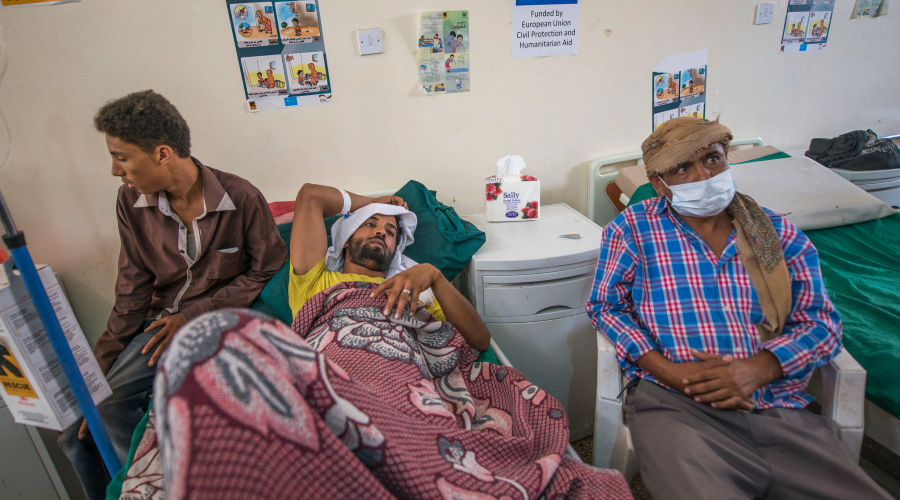Yemen’s Triple Emergency
The growing coronavirus outbreak is compounding the toll of the country's civil war and other humanitarian disasters.

Published by The Lawfare Institute
in Cooperation With

Lise Grande, the U.N.’s head of humanitarian operations in Yemen, estimates that the death toll from the coronavirus pandemic could “exceed the combined toll of war, disease, and hunger over the last five years (in Yemen).” That could be more than 230,000 deaths, according to the University of Denver. Yet periodic Saudi airstrikes continue, killing nine children in three separate attacks in northern Yemen in the first week of August, according to the United Nations.
As of Aug. 8, the Yemeni government has reported 1,801 cases, 912 deaths and 513 recoveries, but the actual figures are likely much higher. In late June, I worked with citizen journalists and The Soufan Center to document Yemenis’ stories during the country’s overlapping crises through interviews conducted across southern Yemen using the image verification platform Truepic. A gravedigger told one of our reporting team in Aden that in his graveyard alone “almost 800” patients infected by the coronavirus had been buried during the month of Ramadan, which lasted from April 23 to May 23 this year. This number is difficult to verify, but it fits with other indications that suggest Aden has been overwhelmed by COVID-19, the respiratory disease caused by the novel coronavirus. Burial data showed that 950 people died in the city in the first 17 days of May, triple the figure for the same period in 2019, according to an analysis by Abdullah Bin Ghouth, an epidemiology professor at Hadramout University.
There is a strong humanitarian and security rationale to act to prevent the worst-case scenario. A failure to prevent an unparalleled humanitarian crisis in Yemen will likely result in increasingly powerful security problems and refugee flows. To prevent this from occurring, more international pressure is necessary to end the Saudi bombing campaign and invest in a humanitarian and development relief effort.
Yemen’s COVID-19 Reality
The civil war in Yemen is now approaching its seventh year; it began in late 2014 and was exacerbated by the intervention of the Saudi coalition supporting the internationally recognized government of President Abdurabbuh Mansour Hadi in 2015 to roll back advances by the Houthis, a rebel movement based in the country’s north that has received support from Iran. In 2018, U.N. Secretary-General António Guterres called Yemen “the worst humanitarian crisis in the world.” Two-thirds of the country’s 30 million people currently rely on food assistance, according to UNICEF, and by the end of the year the number of malnourished children in Yemen could increase by one-fifth due to inflation driving up the cost of food.
The coronavirus outbreak has shocked the country’s already fragile health-care system. As the International Rescue Committee reports, half of Yemen’s health facilities are no longer operational because of the conflict, and 18 percent of the country’s 333 districts have no doctors. Medical staff have fled the country, and even before this year, the country’s remaining health resources had been stretched past the breaking point by a severe cholera outbreak that began in 2016 and continues to spread, particularly among the internally displaced population.
Madhi Mahdi Abdel Kawi, head of the intensive care unit at the Aden German International Hospital in Lajh governorate in northern Yemen, was among the first Yemenis to officially learn that he had contracted COVID-19 in the country in early April. “In mid-April, I started showing symptoms of COVID-19,” he told us in an interview that we recorded using Truepic’s verification platform. “I stayed at home for 10 days, but following respiratory symptoms, coughing, and a shortness of breath, I self-admitted to hospital.” He spent another 10 days on a ventilator and in a coma before recovering, and is now back at work.
But many Yemenis lack access to medical facilities, and the pandemic has disrupted access to other essential resources. More than 14.3 million people across the country are in acute humanitarian need and 3.65 million are internally displaced. Ibrahim Awad Suleiman is the designated camp leader of a displaced persons camp in Aden, which has approximately 240 families. The delivery of food has stopped since the coronavirus outbreak. “We have no access to face masks, soap, detergents, or any other hygiene products at all. You can see trash everywhere, at the gates and all around,” he told us.
Other residents of Aden described the ways that hospitals inundated with COVID-19 patients had affected access to general care. One Aden resident told me, “My close friend’s father had high blood pressure, so he went to the hospital to get checked out, but the medical staff panicked, and the hospital didn’t admit him.” He later passed away.
The issue outside cities is particularly worrisome because of the lack of health care in rural areas, and security issues and poverty that can limit rural Yemenis’ ability to travel. “People who are infected with COVID-19 need to be treated, but many of them don’t have access to treatment,” Samar Kanzel, a health and nutrition deputy program manager at Action Against Hunger (ACF), told me recently.
Rana Abdullah, also a health and nutrition program manager at ACF, noted that many Yemenis do not have access to testing, let alone treatment. “Abyan and neighboring areas lack testing facilities,” she said, adding that “those living in remote areas face significant difficulties in getting tested, because they have to travel long distances and incur the expenses.”
A Failed International and Domestic Response
International efforts to prevent and contain the coronavirus outbreak remain limited. During a recent international aid conference convened by the United Nations in June, donors pledged $1.35 billion in humanitarian aid for Yemen, falling $1 billion short of what the United Nations needed to avoid shutting down some of its humanitarian programming, including non-coronavirus-related projects, in the coming weeks and months.
The Saudi blockade of the country, which was implemented in 2017, continues to limit Yemenis’ access to life-saving humanitarian aid. Sarah Chauvin, who works for the humanitarian relief organization Medicines du Monde (MDM), said that prior to the outbreak the blockade had already driven up the price of thermometers to $50. Now, with the limited supply stretched further by the health crisis, they cost $600.
In the north of the country, the Houthi government has refused to acknowledge the virus or report any numbers regarding cases or mortality. In June, the Houthis’ health ministry in Sanaa said that foreign countries’ decisions to publicize their coronavirus case counts had “created a state of fear and anxiety that was more deadly than the disease itself.” The virus is believed to be spreading rapidly, but the Houthis refuse to acknowledge the cases or implement prevention methods. According to one common rumor circulating among nongovernmental organizations in Yemen, people in the north suspected of contracting the coronavirus are being given lethal injections to avoid further contagion.
The government’s poor messaging also extends to public safety information. In the absence of clear guidance, misinformation is spreading. Chauvin said that some of the folk cures she’s heard include claims that “shooing a cat” cures you and that wearing a veil protects you against catching COVID-19. A lack of knowledge, money or resources prevents many Yemenis from getting sufficient medical care.
Facilitating a Humanitarian Response
All parties need to agree to a cease-fire in order to prevent further exacerbating Yemen’s health crisis. For that to happen, the main parties—the Houthis and the Hadi government—will have to reconsider their maximalist aims and accept that the country is divided. Presumably some form of decentralized state with federated regional governance will be needed to help bring the country together.
Beyond a political settlement, Yemen requires concerted international support. While the United Nations can help, the United States, Russia and China will likely have to place renewed pressure on Iran and Saudi Arabia to end their participation in the conflict and ensure a cease-fire. If they do not, they will allow a coronavirus hotspot to persist in Yemen, resulting in the deaths of untold numbers of Yemenis and risking the further spread of the disease through migration.
The international community has an important role to play. In the short term, they need to get aid into Yemen. The United States and European countries need to pressure the Saudi government to lift the blockade and ease the situation for aid organizations, which are struggling to get food and medical supplies into the country. This will help provide the resources aid agencies on the ground desperately need to work toward containing the virus.
But this work will not be sustainable without more funding from donors. Along with more international support, aid organizations need to build support and trust with their donors and international partners, which has been complicated by the difficult operating conditions in the country. Aid organizations need to demonstrate that they are delivering impactful aid through increased monitoring and evaluation of their programs. Aid agencies need to collaborate with the United Nations to provide factual information on the nature, risks and spread of the coronavirus in Yemen and distribute this information to communities across the country. Efforts to do so are already underway from initiatives such as the U.N.’s Verified program.
Beyond these immediate needs, the International Monetary Fund and the World Bank also have an important role to play in providing financial support to help alleviate Yemen’s humanitarian disaster and begin the process of rebuilding. Yemen needs more hospitals, more schools and more support for the marginalized, hungry and vulnerable.
The situation in Yemen is dire, but if steps aren’t taken to halt the conflict and contain the spread of the coronavirus, the world’s worst humanitarian crisis will only worsen further. For that scenario to be avoided, a variety of states, institutions and humanitarian organizations will have to act collectively in pursuit of humanitarian and their own security interests.





